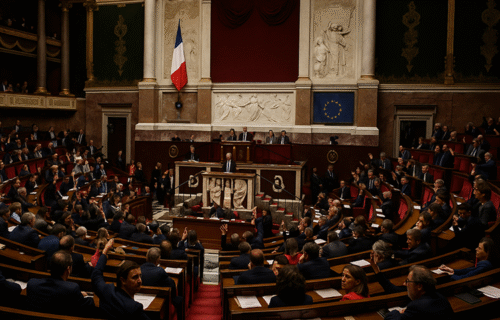France is navigating one of its most turbulent political moments in recent years, with the reappointed Prime Minister Sébastien Lecornu attempting to restore stability to a government struggling under mounting economic, social and institutional pressures. His proposal to suspend the contentious pension reform law until after the 2027 presidential election has become the defining symbol of a fragile administration fighting for survival.
The pension reform, pushed through in 2023 despite widespread protests, raised the retirement age from 62 to 64 and triggered months of unrest across the country. Now, with inflation concerns, labour tensions and weak public support, Lecornu’s suspension plan is seen as an attempt to appease opposition lawmakers and avoid a no-confidence vote that could collapse the government.
The decision comes just days after Lecornu announced a new cabinet following his reappointment by President Emmanuel Macron. The reshuffle was meant to project continuity while calming political divisions, but critics argue that the government remains paralysed by the same fault lines that have eroded Macron’s authority. Many of the reappointed ministers are loyalists, signalling a lack of new political energy within the administration.
At the same time, France’s business community is growing anxious. The country’s influential technology sector — once hailed as Europe’s digital growth engine — has expressed concern over the deepening political uncertainty. Industry leaders warn that the ongoing crisis has slowed investment decisions, disrupted regulatory clarity and undermined France’s appeal as a hub for innovation. Several executives have described the atmosphere as one of “policy drift,” with no clear vision emerging from Paris.
The broader political landscape is even more fractured. Opposition parties on both the far right and far left are seizing on Macron’s weakening position, framing his government as out of touch and incapable of governing effectively. A wave of no-confidence motions looms as the government prepares to present its 2026 budget, already complicated by the potential cost of reversing or delaying the pension law.
Analysts at Reuters and Le Monde note that Macron’s political isolation has grown steadily since his centrist alliance lost its parliamentary majority in 2022. His decision to appoint Lecornu — considered pragmatic but politically cautious — reflects an effort to maintain control amid a rising tide of populist pressure. Yet, even within Macron’s camp, doubts are surfacing about whether the government can survive the remainder of the term without broader alliances or a strategic reset.
Despite these headwinds, Macron’s team insists that the institutional foundations remain intact. The Élysée continues to promote fiscal discipline and reform-driven governance as essential to maintaining France’s credibility within the European Union. However, the growing disconnect between policy ambition and political reality has turned what began as a parliamentary dispute into a deeper crisis of leadership.
As the government manoeuvres to prevent a collapse, France finds itself in a state of suspended motion — with economic actors anxious, opposition parties emboldened, and a presidency struggling to project authority. Lecornu’s suspension of the pension reform may buy temporary stability, but for many observers, it also underlines the fragility of a government that appears to be governing on borrowed time.
Source: Reuters and Le Monde
